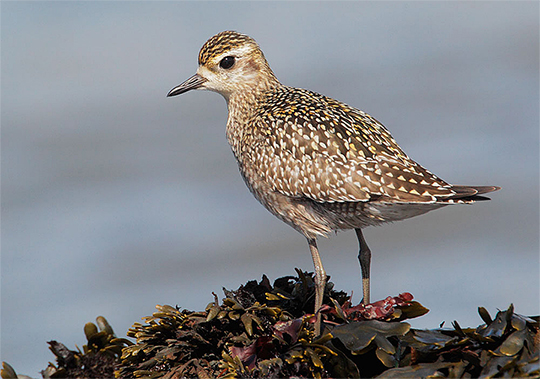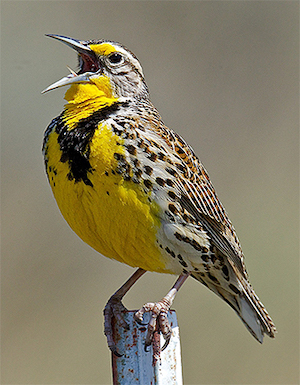

Join BirdNote tomorrow, November 30th!
Illustrator David Sibley and actor H. Jon Benjamin will face off in the bird illustration battle of the century during BirdNote's Year-end Celebration and Auction!
This blog is the first in a series about the ways that members of the BirdNote community are working to #BringBirdsBack.
“We all have a responsibility. It’s not so much conservation. It’s what I call responsible stewardship of our planet.” — Dr. William Keppler
It’s no secret that birds are in danger. Since 1970, the population of North American birds has declined by nearly 30 percent, or 3 billion birds, according to a 2019 study published in the journal Science.
I’m curious about the ways that members of the BirdNote community are responding to this crisis. The need for strong environmental leadership is undeniable. And in a way, everyone has to be a leader. But what does it mean to be a leader?
I turned to Dr. William Keppler, long-time BirdNote fan and supporter, for some insight.
Dr. Keppler, who urges me to call him Bill, describes himself as a retired academic with expertise in biological science, zoology, and genetics. He spent much of his career in leadership positions, including as dean of Boise State University’s College of Arts and Sciences, dean of Florida International University’s College of Health, and president of the National College of Natural Medicine in Portland, Oregon.
Bill’s fascination with birds began the day his mother took him to the library, when he was about seven years old. There, he happened upon a book about woodpeckers. “After I read that book,” Bill recounts, “birds were my thing.”
Bill’s ongoing curiosity about birds and wildlife, as well as his desire to learn as much as he could about the natural world, carried him to career heights in academia, with publications in renowned scientific journals, honors, awards, and advanced degrees. Teaching in national parks and lecture halls, Bill shared his knowledge with generations of students.
I asked Bill how he thinks people could act, given the urgent need for conservation. The way Bill sees it, environmental leadership is about more than conservation.
“I think conservation is part of responsible stewardship,” Bill explains. “With responsible stewardship comes a value system, and that value system means that we take our responsibilities seriously, both individually and collectively.”
It’s going to take everyone who values birds working together to bring them back. Here are some key findings from the Science study:
- The boreal forest has lost 500 million birds, or one-third of its population.
- Grassland birds, such as our beloved meadowlarks, have declined by 53 percent, or more than 720 million birds.
- Birds such as swallows, nighthawks, and flycatchers are down by 32 percent, or 160 million.
- Coastal shorebirds lost more than one-third of their population.
- Even common birds at our feeders, such as Dark-eyed Juncos, and White-throated Sparrows have declined.
These massive declines are due largely to habitat loss, climate change and other factors. Collisions with glass, free-roaming cats, and pesticides contribute as well.
Bill implores us to pay close attention to the story that’s unfolding. “Birds are litmus indicators of our environment,” he says. The crisis for birds represents the natural world’s waning ability to support life, including human life.
Fortunately, birds are resilient when given a chance. Dwindling raptor populations in the 1970s rebounded when the pesticide DDT was banned and the Endangered Species Act provided protection. Waterfowl have increased by 56 percent thanks to habitat restoration during the past 50 years. These birds are thriving today because environmental leaders initiated action, and people who value birds and nature engaged in responsible stewardship. Today, we must follow their example for the three billion birds that have vanished.
Wondering where to start? The #BringBirdsBack website is a fantastic resource to begin your path to environmental leadership.
I asked Bill what I could do to support birds in my own back yard, and he offered these two easy suggestions as a starting point:
- Cultivate a garden of native plants, particularly plants that produce berries
- Put up feeders (please practice responsible birdfeeding) and offer water
Bill emphasized that it’s a joyful task to create habitat for birds. As I reflect on my conversation with Bill, I’m beginning to understand something important. There are so many things we can do to change our relationship with the natural world. And maybe that’s the basis of environmental leadership: recognizing the enormous value in the little things that make a big difference when everyone participates.
“I have been blessed all of my life,” says Bill. “Anything I can do to support the responsible stewardship of our planet with the time I have remaining . . . I really think that’s the critical thing.”
Want to let us know what you’re doing to support birds during this critical time? Drop us a line with your story. Together, we can #BringBirdsBack.



